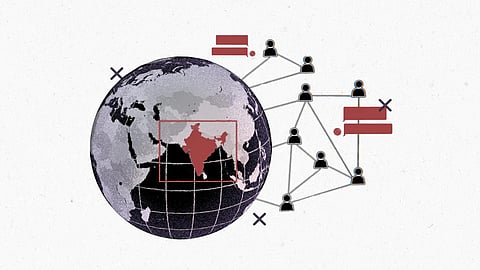New Delhi, Jan 30 (PTI) A fresh plea has been filed in the Supreme Court on the alleged use of Israeli spyware Pegasus, seeking that the court take cognisance of a New York Times report on it and order a probe into the 2017 defence deal with Israel.
The media report claiming India bought Pegasus spyware as part of a USD 2 billion defence deal with Israel in 2017 has triggered a major controversy with the Opposition alleging that the government indulged in illegal snooping that amounted to "treason".
The plea filed by advocate ML Sharma, who is one of the original petitioners in the case before the top court, said the deal was not approved by Parliament and, therefore, needs to be cancelled and money be recovered.
He urged the Supreme court to issue suitable directions for registering a criminal case and to investigate the impugned Pegasus spyware purchase deal and alleged misuse of public funds in the interest of justice.
The media report has said Pegasus and a missile system were the "centrepieces" of a roughly USD 2 billion deal of sophisticated weapons and intelligence gear between India and Israel in 2017.
The NYT, in its report titled 'The Battle for the World's Most Powerful Cyberweapon', said the Israeli firm NSO Group had for nearly a decade been "selling its surveillance software on a subscription basis to law-enforcement and intelligence agencies around the world, promising that it could do what no one else — not a private company, not even a state intelligence service — could do: consistently and reliably crack the encrypted communications of any iPhone or Android smartphone".
On October 27, last year, the Supreme court had appointed a 3-member panel of cyber experts to probe the alleged use of Pegasus for surveillance of certain people in India, saying the state cannot get a "free pass" every time the spectre of national security is raised and it cannot be the bugbear that the judiciary shies away from.
In one of the significant verdicts in recent times over the issue of citizens' right to privacy, a bench headed by Chief Justice of India, N V Ramana had said that mere invocation of national security by the state cannot render the judiciary a "mute spectator" and asserted that indiscriminate spying on individuals in a democratic country cannot be allowed.
The Supreme court then set up the committee comprising former Supreme Court judge, Justice R.V.Raveendran and two experts drawn from cyber security and digital forensics.
The Supreme court had said it is appointing the committee in view of the six compelling circumstances: Right to privacy and freedom of speech are alleged to be impacted, which needs to be examined; entire citizenry is affected by such allegations due to the potential chilling effect, no clear stand taken by the Centre regarding actions taken by it and seriousness accorded to the allegations by foreign countries and involvement of foreign parties.

